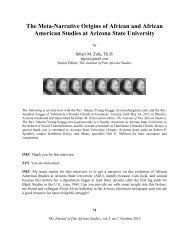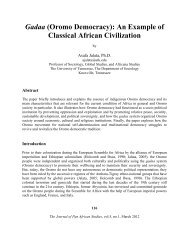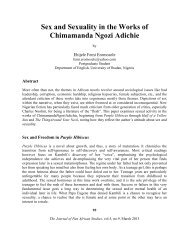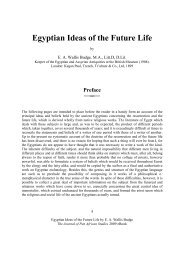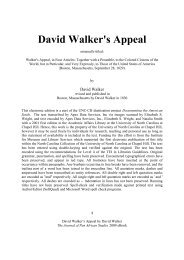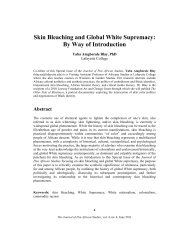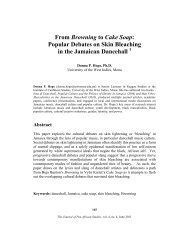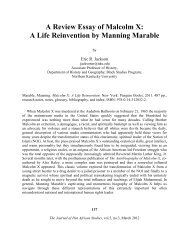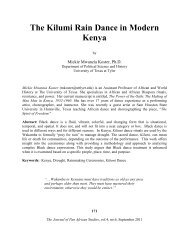Post-Colonial Reading Strategies and the Problem of Cultural ...
Post-Colonial Reading Strategies and the Problem of Cultural ...
Post-Colonial Reading Strategies and the Problem of Cultural ...
Create successful ePaper yourself
Turn your PDF publications into a flip-book with our unique Google optimized e-Paper software.
<strong>Post</strong>-<strong>Colonial</strong> <strong>Reading</strong> <strong>Strategies</strong> <strong>and</strong> <strong>the</strong> <strong>Problem</strong> <strong>of</strong><br />
<strong>Cultural</strong> Meaning in African/Black 1 Literary<br />
Discourse<br />
by<br />
Nelson O. Fashina, Ph.D<br />
Department <strong>of</strong> English, University <strong>of</strong> Ibadan, Ibadan.<br />
Nelson Olabanji Fashina teaches African Literature, Theory & Criticism in <strong>the</strong> Department <strong>of</strong><br />
English at <strong>the</strong> University <strong>of</strong> Ibadan with conjunctive interest in Stylistics <strong>and</strong> Sociology.<br />
Abstract<br />
This paper is part <strong>of</strong> <strong>the</strong> author’s research into <strong>the</strong> possibility <strong>of</strong> carving a distinct critical<br />
canon for <strong>the</strong> reading <strong>of</strong> African/Black literature. It has been observed that postcolonial<br />
<strong>the</strong>ory is fraught with many assumptionist errors, one <strong>of</strong> which is to read all postcolonial<br />
discourses as if <strong>the</strong>y are products <strong>of</strong> <strong>the</strong> same cultural, aes<strong>the</strong>tic <strong>and</strong> historical consequences.<br />
Ano<strong>the</strong>r problem is <strong>the</strong> shallow application <strong>of</strong> Western induced meanings on <strong>the</strong> ra<strong>the</strong>r<br />
cryptic semiotic <strong>and</strong> semantic cultural meanings <strong>of</strong> African writings, arts <strong>and</strong> aes<strong>the</strong>tics,<br />
which <strong>of</strong>ten lead to misinterpretations <strong>of</strong> <strong>the</strong> emotions <strong>and</strong> signatures <strong>of</strong> ‘Africanness’ <strong>and</strong><br />
blackness in <strong>the</strong> works. Thus, <strong>the</strong> prefixes ‘pre’ <strong>and</strong> ‘post’ to which Western critical <strong>the</strong>ories<br />
attach base-morphemes like ‘colonial’, ‘modernism’, ‘structuralism’, etc are no African<br />
categories <strong>of</strong> reading <strong>and</strong> signifying meaning. The paper argues <strong>and</strong> illustrates that African<br />
names <strong>of</strong> humans, flora <strong>and</strong> fauna, <strong>and</strong> objects as used in African literary <strong>and</strong> cultural<br />
discourses are ritualistic <strong>and</strong> historical. They carry some dense sacred meanings. Drawing<br />
examples <strong>of</strong> colonial misconceptions, <strong>the</strong> paper interrogates Jean Copans’ claim on <strong>the</strong> eve <strong>of</strong><br />
<strong>the</strong> 21 st century that “<strong>the</strong>re is nothing like African studies …” <strong>and</strong> conflates this with Biodun<br />
Jeyifo’s Soyinka Nobel Anniversary lecture (2006) to interrogate his ideological construction<br />
that present generation <strong>of</strong> African scholars are “Unfortunate children <strong>of</strong> fortunate parents” <strong>of</strong><br />
<strong>the</strong> second <strong>and</strong> third generations. It draws practical examples <strong>and</strong> concludes that <strong>the</strong>re is a<br />
domain <strong>of</strong> cultural meaning requiring <strong>the</strong> services <strong>of</strong> active bearers <strong>of</strong> <strong>the</strong> tradition to decode.<br />
Keywords: postcolonial, African/Black discourse, Copans, Jeyifo, sacred meanings, prefix,<br />
decode.<br />
60<br />
The Journal <strong>of</strong> Pan African Studies, vol.2, no.5, July 2008
One <strong>of</strong> <strong>the</strong> greatest intellectual bugs in African Studies since <strong>the</strong> 1950s has been <strong>the</strong><br />
nationalist search for African cultural, literary, social <strong>and</strong> political emancipation anchored on<br />
<strong>the</strong> quest for universal acceptance <strong>and</strong> recognition. There has been an artificial <strong>and</strong> human<br />
created perplexing cultural identity problem which has not only challenged intra-African<br />
studies but has also misunderstood <strong>the</strong> transformational cultural <strong>and</strong> semiotic codes that<br />
govern <strong>the</strong> production <strong>of</strong> African cultural continuities in <strong>the</strong> Diaspora. Arguably, <strong>the</strong> 1980s<br />
qualify as <strong>the</strong> golden age <strong>of</strong> African discourse emancipation when <strong>the</strong> decade is weighed on<br />
<strong>the</strong> balance <strong>of</strong> an ambiguous cultural appropriation <strong>and</strong> resistance to Euro-American models<br />
<strong>of</strong> literary interpretation 2 . However, <strong>the</strong> 1990s till date has witnessed attempts at discourse<br />
cultural revivalism <strong>and</strong> redefinitions that are distilled from “<strong>the</strong> voiced <strong>and</strong> unvoiced stories<br />
<strong>and</strong> interpretations <strong>of</strong> African conditions before, during <strong>and</strong> after colonialism” (Parker <strong>and</strong><br />
Starker, 1995:11).<br />
The consciousness to create a code for African cultural interpretation informed <strong>the</strong> first<br />
International Congress <strong>of</strong> Negro Writers <strong>and</strong> Artists held in Paris in 1956 with focus on <strong>the</strong><br />
“The Crisis in Negro Culture”. Subsequent conferences <strong>and</strong> congresses <strong>of</strong> African-American<br />
writers <strong>and</strong> critics have examined <strong>the</strong> negative impact <strong>of</strong> writing or book-culture (literary<br />
<strong>the</strong>ory <strong>and</strong> interpretation) on <strong>the</strong> drive for a black critical aes<strong>the</strong>tics (Fashina, 1997:11).<br />
Several cultural genetic factors foreground this sense <strong>of</strong> nationalism <strong>and</strong> pan-Africanist<br />
conciousness. Among <strong>the</strong>m was <strong>the</strong> need to create a <strong>the</strong>ory <strong>of</strong> Africanism <strong>and</strong> Blackness,<br />
which is distilled from <strong>the</strong> homogeneous pattern <strong>of</strong> emotive <strong>and</strong> mythical interpretations <strong>of</strong><br />
values in contrast to <strong>the</strong> European induced images <strong>and</strong> conceptions <strong>of</strong> our universe. This is<br />
what Abiola Irele (1990:54) describes as “<strong>the</strong> organic aspect <strong>of</strong> African imagination” <strong>and</strong><br />
what Fashina 1994:73) indicates as “<strong>the</strong> symbiotic aspect <strong>of</strong> African collective<br />
consciousness”.<br />
Quite against this strive for African nationalist consciousness in culture <strong>and</strong> literary studies is<br />
<strong>the</strong> European st<strong>and</strong>ard interpretation <strong>of</strong> African studies as mere mental construct than a<br />
researchable reality. A renowned French Sociologist, Pr<strong>of</strong>essor Jean Copans, in a lecture<br />
entitled “ African Studies on <strong>the</strong> Eve <strong>of</strong> <strong>the</strong> 21 st century” 3 delivered at <strong>the</strong> Drappers<br />
Auditorium, Centre for African Studies, University <strong>of</strong> Ibadan, Nigeria on April 12, 1999, reechoed<br />
<strong>the</strong> same old colonialist view about Africa, African cultural studies <strong>and</strong> <strong>the</strong><br />
indigenization <strong>of</strong> cultural <strong>the</strong>ories. He argues that:<br />
… <strong>the</strong>re is no such thing as an African society understood as a continental one. And, for<br />
Africans, <strong>the</strong> study <strong>of</strong> <strong>the</strong>ir own societies l<strong>and</strong> culture has nothing specifically African to it.<br />
We do not call <strong>the</strong> study <strong>of</strong> French sociology French studies! But <strong>the</strong>re is a French tradition<br />
<strong>of</strong> African Studies. And I have to recall it for it is quite different from <strong>the</strong> Anglo- American<br />
one. The multi-disciplinary tradition in itself is an interesting feature <strong>and</strong> it spells out a kind<br />
<strong>of</strong> hierarchy <strong>of</strong> social sciences. To conclude this review <strong>of</strong> traditions, we should ask ourselves<br />
if <strong>the</strong>re is such a domain as African Studies (MS, p.1).<br />
61<br />
The Journal <strong>of</strong> Pan African Studies, vol.2, no.5, July 2008
This critical onslaught on <strong>the</strong> domain <strong>of</strong> African Studies is, ironically, significant in many<br />
respects. First, <strong>the</strong> venue <strong>of</strong> <strong>the</strong> lecture was <strong>the</strong> Institute <strong>of</strong> African Studies in a benchmark<br />
African University. Pr<strong>of</strong>essor Copan’s submission is invariably tantamount to a plea for <strong>the</strong><br />
closure <strong>of</strong> that renowned center for African studies <strong>and</strong>, perhaps, <strong>the</strong> immediate dismissal<br />
altoge<strong>the</strong>r, <strong>of</strong> <strong>the</strong> Pr<strong>of</strong>essors <strong>and</strong> researchers <strong>of</strong> African Studies at <strong>the</strong> center. For Pr<strong>of</strong>essor<br />
Copans, “ <strong>the</strong>re is no such thing as an African society understood as a continental one”, <strong>and</strong><br />
<strong>the</strong>re is nothing that is African-specific in Africans’ study <strong>of</strong> <strong>the</strong>ir own societies. He bases his<br />
argument partly on <strong>the</strong> dependence on Western <strong>the</strong>ories <strong>and</strong> analytical models in<br />
Anthropology, Sociology, political Science, economics, Literature <strong>and</strong> o<strong>the</strong>r cultural studies.<br />
Copans’ Ibadan Lecture <strong>of</strong> April 12 1999 tends to dwarf <strong>the</strong> status <strong>of</strong> African studies on <strong>the</strong><br />
eve <strong>of</strong> <strong>the</strong> 21 st century. And that was thirteen years after <strong>the</strong> Western literary hegemony<br />
conferred recognition on African literature by awarding <strong>the</strong> prestigious Nobel Prize in<br />
literature for <strong>the</strong> first time to an African writer, Wole Soyinka. While we say Copans’<br />
polemics is provocative, Biodun Jeyifo in ano<strong>the</strong>r Public Lecture organized by <strong>the</strong><br />
Association <strong>of</strong> Nigeria Authors to mark <strong>the</strong> 20years <strong>of</strong> Soyinka’s Nobel award, gave a<br />
lamentation on <strong>the</strong> “Unfortunate children <strong>of</strong> neo-globalization” (Ile-Ife, 2006). This <strong>of</strong>ten<br />
besetting argumentation about <strong>the</strong> domain <strong>of</strong> African discourse becomes a blackmailing<br />
irony. The irony is triple-headed: One, <strong>the</strong> academic audience at Copans’ lecture were largely<br />
in <strong>the</strong> class <strong>of</strong> Jeyifo’s fourth <strong>and</strong> fifth generations <strong>of</strong> African studies faculty, <strong>and</strong> that is <strong>the</strong><br />
class Jeyifo categorizes as <strong>the</strong> “Unfortunate Children <strong>of</strong> Fortunate Parents.” Jeyifo laments,<br />
… <strong>the</strong> psychological conditions that African writers, critics <strong>and</strong> scholars <strong>of</strong> <strong>the</strong> fourth <strong>and</strong><br />
fifth generations have had to endure in <strong>the</strong> last two decades which correspond to <strong>the</strong> period<br />
<strong>of</strong> hegemonic liberal globalization have been nothing short <strong>of</strong> nightmarish, compared with<br />
<strong>the</strong> situation <strong>of</strong> <strong>the</strong> writers <strong>and</strong> critics <strong>of</strong> <strong>the</strong> first, second <strong>and</strong> even third generations 4 (The<br />
Guardian, Friday Sept.8 2006).<br />
The second irony is more heart cutting than <strong>the</strong> first: Copans’ denial <strong>of</strong> <strong>the</strong> material existence<br />
<strong>of</strong> African Studies, <strong>and</strong> invariably, African literature is a negation <strong>and</strong> seeming falsification<br />
<strong>of</strong> <strong>the</strong> acclaimed golden age (second <strong>and</strong> third generation) <strong>of</strong> <strong>the</strong> discipline when, according<br />
to Jeyifo, “ writers, critics <strong>and</strong> scholars <strong>of</strong> modern African literature, both foreign <strong>and</strong> local,<br />
were responsible for bringing <strong>the</strong> literature into existence, were in <strong>the</strong> main produced by<br />
‘national universities’, both in <strong>the</strong> colonies <strong>and</strong> in <strong>the</strong> metropolitan centers <strong>of</strong> <strong>the</strong> global<br />
order” (29).<br />
If we allow Copans’ <strong>the</strong>sis as a factual inscription, <strong>the</strong>n Jeyifo’s class <strong>of</strong> “Fortunate Parents”<br />
do not exist at all. And so <strong>the</strong> children are worse than being “Unfortunate” because <strong>the</strong>ir<br />
‘parents’ have no historical literary legacy that existed <strong>and</strong> that is worthy <strong>of</strong> being inherited<br />
or appropriated to modern African writing, criticism <strong>and</strong> scholarship. But I must quickly add<br />
that <strong>the</strong>re is problem ei<strong>the</strong>r way we chose to receive or read Copan’ submission.<br />
62<br />
The Journal <strong>of</strong> Pan African Studies, vol.2, no.5, July 2008
The problem is such that elements <strong>of</strong> <strong>the</strong> older generation who were present at <strong>the</strong> Copans’<br />
IFRA sponsored Lecture maintained a culture <strong>of</strong> diplomatic silence <strong>and</strong> even were cautious to<br />
allow <strong>the</strong> infant faculty (among <strong>the</strong> best <strong>of</strong> <strong>the</strong> infant academic) to interrogate <strong>the</strong> French<br />
Pr<strong>of</strong>essor <strong>of</strong> Oriental Sociology. Well, <strong>the</strong> possible reason being fear <strong>of</strong> losing <strong>the</strong> largesse <strong>of</strong><br />
Research grants <strong>and</strong> Fellowships at Copan’ disposal. I felt too unaccountably embarrassed<br />
<strong>and</strong> overwhelmed by <strong>the</strong> intimidating silence <strong>of</strong> senior colleagues – a consumptively begotten<br />
<strong>and</strong> inherited fear <strong>of</strong> being br<strong>and</strong>ed immodest <strong>and</strong> disrespectful has delayed my completion<br />
<strong>and</strong> publication <strong>of</strong> this rejoinder to Copans’ assault on <strong>the</strong> epistemology <strong>of</strong> African Studies in<br />
1999, at one <strong>of</strong> our ‘first <strong>and</strong> best’ “national universities … breeding grounds for <strong>the</strong> nascent<br />
nationalist elites <strong>of</strong> <strong>the</strong> post-colonial nation-state <strong>and</strong> society in Africa <strong>and</strong> o<strong>the</strong>r parts <strong>of</strong> <strong>the</strong><br />
developing world” (Jeyifo, 29). What an irony that immediately reckons itself by calling <strong>the</strong><br />
third irony, which I suggest to be that ANA’s celebration <strong>of</strong> <strong>the</strong> 20 years <strong>of</strong> <strong>the</strong> Nobel Prize in<br />
literature award to Soyinka at Obafemi Awolowo University, Ile Ife, would have been better<br />
tagged immemorial or Death Anniversary if we accept Jeyifo’s (2006:29) <strong>the</strong>sis <strong>of</strong><br />
“penultimate barbarisms <strong>of</strong> <strong>the</strong> present era” whereby “in <strong>the</strong> last two decades, since 1986,<br />
many <strong>of</strong> <strong>the</strong>se ideas <strong>and</strong> movements (ideology <strong>of</strong> literature <strong>and</strong> social liberation) have been<br />
ei<strong>the</strong>r totally ab<strong>and</strong>oned or are in fractious <strong>and</strong> messy disarray” (words in paren<strong>the</strong>sis mine).<br />
A conjunctive relation <strong>of</strong> Copans’ onslaught <strong>and</strong> Jeyifo’s backlash, though very widely<br />
different in terms <strong>of</strong> <strong>the</strong>ir underlying ideological templates, would foreground a possible<br />
conception <strong>of</strong> current African writers, critics <strong>and</strong> scholars as being better described as<br />
<strong>Cultural</strong> <strong>and</strong> Literary Orphans 5 ra<strong>the</strong>r than <strong>the</strong> seeming Jeyifo-esque characterization <strong>of</strong> this<br />
present generation as “The Unfortunate Children <strong>of</strong> Fortunate Parents”. While Jeyifo<br />
privileges <strong>the</strong>ir own generation <strong>of</strong> African letters <strong>and</strong> describes <strong>the</strong>m as “fortunate parents”,<br />
Copans’ argument serves to checkmate that <strong>the</strong>sis. For Copans’ African literature may not be<br />
reckoned to exist since <strong>the</strong> language, style, form <strong>and</strong> <strong>the</strong>ory for reading it are essentially<br />
derived from <strong>the</strong> same colonial textual infrastructures that pro-African scholars use as reading<br />
strategies on <strong>the</strong> one h<strong>and</strong>, only to turn around at <strong>the</strong> o<strong>the</strong>r h<strong>and</strong> <strong>and</strong> claim that those Western<br />
instruments are inappropriate. Thus to Copans’ <strong>the</strong>re is nothing like African literature, but<br />
<strong>the</strong>re are French, British, Portuguese, Spanish, etc traditions <strong>of</strong> African literature. This is a<br />
frontal interrogation <strong>of</strong> Jeyifo’s claim that <strong>the</strong>re exists “Fortunate Parents” <strong>of</strong> “Unfortunate<br />
Children” in <strong>the</strong> literary history <strong>and</strong> tradition <strong>of</strong> African literature. Invariably, this means <strong>the</strong><br />
absence <strong>of</strong> a “Fortunate” generation <strong>of</strong> African scholar-writers <strong>and</strong> critics. Copans asserts that<br />
cultural plurality, <strong>and</strong> <strong>the</strong> disparity <strong>of</strong> colonial experience based on <strong>the</strong> different modes <strong>of</strong><br />
colonial partition <strong>and</strong> governance <strong>of</strong> Africa by <strong>the</strong> French, British, Spanish <strong>and</strong> Portuguese<br />
have tended to create a culturally, socially <strong>and</strong> linguistically heterogeneous ethnic<br />
nationalities, groups <strong>and</strong> communities across ex-colonial Africa. He argues that <strong>the</strong>se<br />
pluralities foreclose any claim to cultural nationalism in Africa. Again this claim may st<strong>and</strong><br />
on <strong>the</strong> truism that most Africans do not communicate intra-continentally, because we do not<br />
have an African specific continental language <strong>of</strong> communication. We rely on <strong>the</strong> use <strong>of</strong><br />
European languages for sharing <strong>the</strong> ideas <strong>and</strong> meanings in us.<br />
63<br />
The Journal <strong>of</strong> Pan African Studies, vol.2, no.5, July 2008
Thus, we have to travel in language terrain through <strong>the</strong> tongue <strong>of</strong> our colonial masters beyond<br />
<strong>the</strong> atlantics in order to exchange meanings with our own African bro<strong>the</strong>rs. In spite <strong>of</strong> this<br />
constraint however <strong>the</strong> language <strong>of</strong> works that can really st<strong>and</strong> for African literature is not<br />
cast in European phonological, lexico-semantic <strong>and</strong> discursive patterns <strong>and</strong> st<strong>and</strong>ards. Ra<strong>the</strong>r,<br />
African literature displays <strong>the</strong> linguistic, gnomic <strong>and</strong> cultural symbols as well as oral<br />
verbalization aes<strong>the</strong>tics <strong>and</strong> convolution both <strong>of</strong> cosmic, e<strong>the</strong>real <strong>and</strong> terrestrial space, which<br />
make it to maintain a unique identity even in its relative hybrid status. For this, we can argue<br />
that quite against Copans’ submission, <strong>the</strong>re exists an African tradition <strong>of</strong> literature with a<br />
confluence <strong>of</strong> contribution to <strong>the</strong> global ocean <strong>of</strong> literary, linguistic <strong>and</strong> cultural studies.<br />
Today, literature <strong>and</strong> language studies <strong>of</strong> <strong>the</strong> hegemonic metropolitan order is not complete<br />
without a consideration <strong>and</strong> inclusion <strong>of</strong>, for example, <strong>the</strong> traditions <strong>of</strong> Africa <strong>and</strong> <strong>the</strong> orient<br />
cast in form <strong>of</strong> o<strong>the</strong>r ‘Englishes’. This imposes a presence <strong>of</strong> inextricable varieties <strong>of</strong> African<br />
English on <strong>the</strong> study <strong>of</strong> English as used by <strong>the</strong> native speakers in Britain. Thus, <strong>the</strong> colonized<br />
has gained <strong>the</strong> seizure <strong>of</strong> <strong>the</strong> colonizer’s language <strong>and</strong> tradition <strong>of</strong> literature; in addition to <strong>the</strong><br />
former’s largely orate tradition <strong>of</strong> versification <strong>and</strong> interpreting discourses. The latter has also<br />
gained from <strong>the</strong> creative enrichment <strong>of</strong> its values through <strong>the</strong> presence <strong>of</strong> <strong>the</strong> African ‘O<strong>the</strong>r’<br />
as an alternative tradition.<br />
After almost 50 years <strong>of</strong> Africa’s independence it is hoped that such whimsical claims by<br />
Copans <strong>and</strong> lamentations by Jeyifo would be on <strong>the</strong> wane, for Copans made a spurious claim<br />
in his paper –<br />
African Studies are today a misnomer in that it includes both studies <strong>of</strong> African societies by<br />
outsiders <strong>and</strong> insiders whereas when <strong>the</strong> expression was coined it was just (emphasis mine) a<br />
multi-disciplinary complex <strong>of</strong> Western sciences devoted to foreign cultures. Therefore we<br />
have to underst<strong>and</strong> <strong>the</strong> historical logics that have created cultural areas studies since<br />
African Studies is but one case out <strong>of</strong> many more (MS, p. 3)<br />
Pr<strong>of</strong>essor Copans’ critical denial <strong>of</strong> <strong>the</strong> vital discipline <strong>of</strong> African cultural studies,<br />
deliberately or mistakenly, obliterates <strong>the</strong> various African archetypal <strong>and</strong> anthropological<br />
antiquities <strong>and</strong> o<strong>the</strong>r living or extinct cultural ingredients, monuments, collectaneas recovered<br />
or discovered in Africa by carbon dating historians <strong>and</strong> oral historiographers since <strong>the</strong> dawn<br />
<strong>of</strong> African cultural studies. For instance, one may ask what social scientific <strong>the</strong>ories <strong>and</strong><br />
models informed <strong>the</strong> unwritten constitutions <strong>of</strong> great African Empires like Ghana, Mali,<br />
Benin, Kanem Bornu <strong>and</strong> Oyo Empires. One may also ask what European induced social<br />
scientific <strong>the</strong>ory or model gave technological enablement to <strong>the</strong> pre-historic cave drawings,<br />
engravings on bones, stones, paintings <strong>and</strong> use <strong>of</strong> cracks <strong>and</strong> mappings employed as pigments<br />
which were usually made from animal <strong>and</strong> vegetable substances. The ancient Egyptians used<br />
papyrus for writing hieroglyphs while <strong>the</strong> antecedents to record keeping in Mesopotamia <strong>and</strong><br />
commemorative inscriptions were done on clay tokens <strong>and</strong> narrative art, respectively. And<br />
<strong>the</strong> use <strong>of</strong> talking drums invented by <strong>the</strong> Yoruba <strong>of</strong> Western Nigeria which later spread to<br />
Guinea <strong>and</strong> Zaire has been subject <strong>of</strong> exotic myth <strong>and</strong> a st<strong>and</strong>point in African oral cultural<br />
studies.<br />
64<br />
The Journal <strong>of</strong> Pan African Studies, vol.2, no.5, July 2008
These are only a brief panorama <strong>and</strong> slight exhibition <strong>of</strong> <strong>the</strong> fodder <strong>and</strong> grounds for <strong>the</strong><br />
reality <strong>of</strong> African cultural studies. In spite <strong>of</strong> <strong>the</strong> variations in language <strong>and</strong> cultural pluralism<br />
informed by <strong>the</strong> heterogeneous colonial experience in Africa sub-region, efforts have been<br />
made by Africanist scholars to trace <strong>the</strong> unbreakable thread <strong>of</strong> cultural link that ties toge<strong>the</strong>r<br />
all Africans as well as o<strong>the</strong>r African continuities in Diaspora.<br />
In fact, Henry Louis Gates, Jr. (1984) has foreclosed all European induced pessimism about<br />
<strong>the</strong> existence <strong>of</strong> a unitary rallying point <strong>of</strong> African cultural convergence <strong>and</strong> homogeneity:<br />
Esu Elegbara in Nigeria <strong>and</strong> Legba among <strong>the</strong> Fan <strong>of</strong> Dahomey whose New World<br />
figurations - Esu in Brazil, Uchu-Elegua in Cuba,Papa Legba in <strong>the</strong> pan<strong>the</strong>on <strong>of</strong> <strong>the</strong> Ioa <strong>of</strong><br />
Voudou in Haiti, <strong>and</strong> Papa La Bas in <strong>the</strong> Ioa <strong>of</strong> Hoodoo in <strong>the</strong> United States - speak<br />
eloquently <strong>of</strong> <strong>the</strong> unbroken arc <strong>of</strong> metaphysical resuppositions <strong>and</strong> patterns <strong>of</strong> figuration<br />
hared through space <strong>and</strong> time among <strong>the</strong> black cultures in West Africa, South America, <strong>the</strong><br />
Carribean <strong>and</strong> <strong>the</strong> United States (286) 6<br />
This great code <strong>of</strong> Africanity <strong>and</strong> blackness can be seen via <strong>the</strong> lens <strong>of</strong> <strong>the</strong> sociology <strong>and</strong><br />
cultural study <strong>of</strong> Africans wherever <strong>the</strong>y co-exist <strong>and</strong> interact socially <strong>and</strong> culturally<br />
anywhere in <strong>the</strong> world. And this is part <strong>of</strong> <strong>the</strong> “great signature <strong>of</strong> blackness” <strong>and</strong> Africanity<br />
which elsewhere we have described under <strong>the</strong> broad study <strong>of</strong> <strong>the</strong> symbiotic contextual <strong>and</strong><br />
cultural configurations in Africa.<br />
It is least significant perhaps to interrogate Copan’s submission that <strong>the</strong> term “African<br />
Studies” was a “coinage” by a Western establishment – <strong>the</strong> social sciences devoted to foreign<br />
cultures. But one needs to remind proponents <strong>of</strong> this kind <strong>of</strong> absence <strong>the</strong>ory <strong>of</strong> Africa <strong>and</strong><br />
African epistemology that criticism, <strong>the</strong>ory <strong>and</strong> dialogical reasoning <strong>and</strong> philosophy are not<br />
alien to African culture <strong>and</strong> traditions. The history pages are replete with records that court<br />
historians <strong>and</strong> poets did exist in <strong>the</strong> palace <strong>of</strong> African monarchs, kings <strong>and</strong> emperors <strong>of</strong> <strong>the</strong><br />
early African empires before <strong>the</strong> invasion <strong>of</strong> <strong>the</strong> continent by Western colonial forces in <strong>the</strong><br />
18 th century. The historians <strong>and</strong> poets were court <strong>of</strong>ficials. Although <strong>the</strong>y were not appointed<br />
or designated by formal university tradition as research fellows <strong>and</strong> scholars, <strong>the</strong>y never <strong>the</strong><br />
less perform such roles <strong>and</strong> functions in <strong>the</strong>ir relative conditions, age <strong>and</strong> time as researchers<br />
in history, ethnography <strong>and</strong> culture. They were <strong>the</strong> unacknowledged sociologists <strong>and</strong><br />
anthropologists <strong>of</strong> <strong>the</strong> African space <strong>of</strong> <strong>the</strong>ir time. And <strong>the</strong> pedigree <strong>of</strong> <strong>the</strong>ir records <strong>and</strong><br />
informal archives have formed part <strong>of</strong> <strong>the</strong> data sites collected by early European<br />
historiographers, ethnographers <strong>and</strong> social researchers whose works form <strong>the</strong> templates for<br />
today’s modern interpretations. Thus, regardless <strong>of</strong> whe<strong>the</strong>r <strong>the</strong> European social science<br />
establishment was <strong>the</strong> biological parent or midwife that took delivery <strong>of</strong> <strong>the</strong> now orphaned<br />
African Studies, <strong>the</strong> fact remains undeniable that <strong>the</strong>re had been a form <strong>of</strong> informal study<br />
about Africa <strong>and</strong> its culture, even though in unsophisticated scale, before <strong>the</strong> invention <strong>of</strong> <strong>the</strong><br />
now canonized term, African Studies, whose paternity Jean Copans decides to push to <strong>the</strong><br />
bench <strong>of</strong> scholarly dispute.<br />
65<br />
The Journal <strong>of</strong> Pan African Studies, vol.2, no.5, July 2008
However, one would inevitably resist <strong>the</strong> temptation to succumb to <strong>the</strong> mis-teaching that<br />
African Studies embody <strong>the</strong> ‘O<strong>the</strong>r’ - non-western cultures, which are primitive as <strong>the</strong>y are<br />
“foreign”. Jean Copans’ kind <strong>of</strong> inscription is tantamount to herding <strong>the</strong> whole <strong>of</strong> <strong>the</strong><br />
postcolonial world into one confluence <strong>of</strong> culture. And this cannot produce a truly objective<br />
<strong>and</strong> scientific result since Africa has its distinct social <strong>and</strong> cultural criteria that are quite<br />
different from those <strong>of</strong> <strong>the</strong> o<strong>the</strong>r postcolonial world. The peculiarity <strong>of</strong> each postcolonial<br />
society <strong>and</strong> <strong>the</strong>ir identity, even within <strong>the</strong> realities <strong>of</strong> commonly shared experience <strong>of</strong><br />
European political <strong>and</strong> economic domination, social <strong>and</strong> cultural repression as well as<br />
subversion <strong>of</strong> values, has been remarked by scholars <strong>of</strong> various research persuasions. An<br />
example is <strong>the</strong> one contained in Cheikh Anta Diop’s The African Origin <strong>of</strong> Civilization,<br />
translated into English by Mercer Cook, New York, Lawrence Hill & Co., 1974.<br />
Copans’ enunciation <strong>of</strong> <strong>the</strong> absence <strong>of</strong> African Studies except as a construct <strong>of</strong> European<br />
social sciences recalls Bill Ashcr<strong>of</strong>t et al’s idea about <strong>the</strong> way <strong>the</strong> West project “authoritative<br />
pictures <strong>of</strong> <strong>the</strong>mselves” which is an act <strong>of</strong> “representations <strong>of</strong> Europe to itself” <strong>and</strong> to o<strong>the</strong>rs<br />
which are <strong>of</strong> course “ a projection <strong>of</strong> European fears <strong>and</strong> desires masquerading as<br />
scientific/’objective’ knowledges” (1995:85). No wonder Edward Said’s discourse on <strong>the</strong><br />
Western invented concept <strong>of</strong> “Orientalism” (1978) is not just in reference to <strong>the</strong> orient, but<br />
about its invention by <strong>the</strong> self-proclaimed Western civilizing praxis. It is probable, however,<br />
if <strong>the</strong> sense <strong>of</strong> <strong>the</strong> oriental which <strong>the</strong> West has constructed is accessible <strong>and</strong> underst<strong>and</strong>able to<br />
<strong>the</strong> Western ‘super-machine’ <strong>of</strong> cultural <strong>the</strong>ory <strong>and</strong> social science. Can <strong>the</strong> Western episteme<br />
share <strong>the</strong> complex l<strong>and</strong>scape <strong>of</strong> cultural signifiers encoded in <strong>the</strong> so-called oriental studies?<br />
We concur that <strong>the</strong> marginalized subsidiary episteme <strong>of</strong> <strong>the</strong> colonized is quite difficult for <strong>the</strong><br />
alien super-efficient (?) critical lens <strong>of</strong> <strong>the</strong> great tradition to underst<strong>and</strong>. According to Bernth<br />
Lindfors (2002:3) “Bearers <strong>of</strong> a culture are better equipped to interpret that culture than aliens<br />
who have experienced its realities only vicariously. Those who share a writer’s background<br />
can more readily comprehend <strong>the</strong> full implications <strong>of</strong> his message”.<br />
The discourse <strong>the</strong>ory <strong>of</strong> <strong>the</strong> black man which has a long history <strong>of</strong> pr<strong>of</strong>ound nurturing,<br />
influence <strong>and</strong> enslavement by <strong>the</strong> Western dominant tradition can decode <strong>and</strong> even recode <strong>the</strong><br />
colonial discourse as a way <strong>of</strong> writing back in anger by using <strong>the</strong> colonizer’s political,<br />
economic, linguistic, literary <strong>and</strong> cultural cudgel against <strong>the</strong> colonizer. Bill Ashcr<strong>of</strong>t et. al.<br />
(1989) has observed, “Instead <strong>of</strong> one hegemonic English we get a plurality Englishes. Thus,<br />
<strong>the</strong> alienating process, which initially served to relegate <strong>the</strong> post-colonial world to <strong>the</strong><br />
margins, turned upon itself <strong>and</strong> acted to push that world through a kind <strong>of</strong> mental barrier from<br />
which all experience could be viewed as uncentred, pluralistic, multi-farious” (12). It<br />
becomes clear that <strong>the</strong> marginality <strong>and</strong> plurality <strong>of</strong> cultures which have seemingly negated<br />
<strong>the</strong> o<strong>the</strong>rwise valid claim to national African cultural studies ironically becomes a source <strong>of</strong><br />
pluri-mental vigor <strong>and</strong> legitimization <strong>of</strong> <strong>the</strong> ironic hold <strong>of</strong> oriental cultures on <strong>the</strong> dominant<br />
colonial cultural praxis. This fact is an inescapable reality from <strong>the</strong> viewpoint that even<br />
commonwealth discourse will not be complete should it write out <strong>of</strong> relevance <strong>the</strong> postcolonial<br />
discourses that are cast in <strong>the</strong> new Englishes.<br />
66<br />
The Journal <strong>of</strong> Pan African Studies, vol.2, no.5, July 2008
Invariably, this critical st<strong>and</strong>point has been foregrounded in Homi Bhabha (1994: 115) in his<br />
submission that <strong>the</strong> dominant colonial knowledges may “become articulated with forms <strong>of</strong><br />
‘native’ knowledges”. This conjunction <strong>of</strong> colonial <strong>and</strong> pre-colonial knowledges is <strong>the</strong><br />
hallmark <strong>of</strong> cultural <strong>and</strong> literary hybridization which today has changed <strong>the</strong> shape <strong>and</strong><br />
character <strong>of</strong> both western <strong>and</strong> post-colonial societies.<br />
If Jean Copans (1999) maintains that <strong>the</strong>re are no African studies, one can justifiably ask<br />
whe<strong>the</strong>r <strong>the</strong>re are Commonwealth studies, American studies, Canadian studies, Caribbean<br />
studies <strong>and</strong> Asian studies. He affirms that <strong>the</strong> diversity <strong>of</strong> colonial experience in Africa is an<br />
antecedent that which provides <strong>the</strong> template for heterogeneity <strong>of</strong> African society. This<br />
criticism comes with <strong>the</strong> heat <strong>and</strong> blow <strong>of</strong> imperial <strong>the</strong>ory <strong>of</strong> <strong>the</strong> colonizer. And it is a<br />
misnormer. The diverse linguistic, social, political, cultural <strong>and</strong> mental influences <strong>of</strong> <strong>the</strong><br />
colonial superstructure on <strong>the</strong> colonized had afforded <strong>the</strong> latter a pluri-mental approach to <strong>the</strong><br />
mastery colonial strategies. Karin Barber (1995:28) has implied that <strong>the</strong> “colonized had<br />
mastered <strong>and</strong> subverted <strong>the</strong> colonial codes. This pluri-mental approach to <strong>the</strong> learning <strong>of</strong> <strong>the</strong><br />
master code brings toge<strong>the</strong>r <strong>the</strong> “literature <strong>of</strong> <strong>the</strong> whole non-metropolitan English-speaking<br />
world” (Barber, 30). The shared experience <strong>of</strong> linguistic <strong>and</strong> cultural diversity, which is<br />
informed by <strong>the</strong> problematic presence <strong>of</strong> <strong>the</strong> colonizer’s language, has tended to fur<strong>the</strong>r<br />
reduce <strong>the</strong> political, historical, cultural <strong>and</strong> linguistic ‘distances’ that existed among <strong>the</strong><br />
colonized societies. This shrink <strong>of</strong> distances leads to <strong>the</strong> sharing <strong>of</strong> uniquely identical<br />
experiences that make <strong>the</strong> o<strong>the</strong>rwise diverse societies to become homogeneous to <strong>the</strong> extent<br />
that a continental African society is evolved. The acquisition <strong>of</strong> European languages, in spite<br />
<strong>of</strong> its culturally deadly consequences, has led to <strong>the</strong> ability <strong>of</strong> o<strong>the</strong>rwise linguistically<br />
heterogeneous African societies to communicate across geographical <strong>and</strong> cultural boundaries<br />
with mutual intelligibility, thus partially dissolving <strong>the</strong> linguistic borders that had existed <strong>and</strong><br />
created divides that mitigated African nationalism <strong>and</strong> continental consciousness before<br />
colonialism.<br />
However, <strong>the</strong> European language speaking post-colonial world share <strong>the</strong> burden <strong>of</strong><br />
problematic presence <strong>of</strong> European languages in terms <strong>of</strong> <strong>the</strong> influence <strong>of</strong> colonial language<br />
on systems <strong>of</strong> thought <strong>and</strong> philosophical reasoning <strong>and</strong> <strong>the</strong> consequent erosion <strong>of</strong> indigenous<br />
cultural values <strong>and</strong> <strong>the</strong> super-imposed instinct <strong>of</strong> <strong>the</strong> educated African which craves for pro-<br />
European st<strong>and</strong>ards. Barber (1994) presents a generalized model <strong>of</strong> a binary world – <strong>the</strong><br />
colonizer <strong>and</strong> <strong>the</strong> colonized – which ensures that analysis focuses on <strong>the</strong> presence <strong>of</strong> <strong>the</strong><br />
imperial language, which is imbued with <strong>the</strong> values <strong>and</strong> experiences <strong>of</strong> European<br />
metropolitan center, thus making <strong>the</strong> language to speak for <strong>the</strong> colonized <strong>and</strong> marginalized.<br />
No doubt African Studies <strong>and</strong> even indigenous African language studies are done in<br />
European languages <strong>and</strong> language structures as well as European analytical models. African<br />
writers, sociologists, anthropologists, historiographers <strong>and</strong> ethnographers do evoke <strong>the</strong><br />
<strong>the</strong>oretical formula <strong>of</strong> <strong>the</strong> West in <strong>the</strong>ir studies <strong>of</strong> African cultural praxis for <strong>the</strong> partial reason<br />
<strong>of</strong> contributing an African dimension <strong>of</strong> knowledge to <strong>the</strong> great Western tradition, <strong>and</strong> as a<br />
way <strong>of</strong> internationalizing <strong>the</strong>ir scholarship.<br />
67<br />
The Journal <strong>of</strong> Pan African Studies, vol.2, no.5, July 2008
Since <strong>the</strong> Western social sciences has propagated itself as <strong>the</strong> most efficient code <strong>of</strong> studies in<br />
universal cultural humanism, <strong>and</strong> since this is <strong>the</strong> mega research methodology <strong>and</strong> data<br />
analytical tool that has regimentation in universities globally, <strong>the</strong>re can probably be no<br />
African specific method meant for global consumption. Thus, <strong>the</strong> colonial system – cultural,<br />
aes<strong>the</strong>tic, literary <strong>and</strong> political – posits itself as both <strong>the</strong> master code <strong>and</strong> <strong>the</strong> post-colonial<br />
episteme, which all o<strong>the</strong>r cultural studies must inevitably consult. And this is <strong>the</strong> underlying<br />
reason for <strong>the</strong> unfortunate trend whereby interpretation <strong>and</strong> critical processing <strong>of</strong> texts in<br />
post-colonial society adopts reading strategies that are conscious <strong>of</strong> <strong>the</strong> colonial, neo-colonial<br />
<strong>and</strong> post-colonial variables in African social life <strong>and</strong> discourse.<br />
There is cause to worry however, if African ex-colonial literature texts can be interpreted,<br />
criticized <strong>and</strong> <strong>the</strong>orized only with reference to <strong>the</strong> base-morpheme ‘colonial’ a term to which<br />
o<strong>the</strong>r bound morphemes like ‘pre’ <strong>and</strong> ‘post’ become affixes. Thus, unfortunately, coloniality<br />
becomes a st<strong>and</strong>ard literary, <strong>the</strong>oretical <strong>and</strong> political premise for interpretation <strong>of</strong> African<br />
textual discourse. There is, in deed, <strong>the</strong> need to receive with severe caution, <strong>the</strong> critical<br />
discourses that tend to police literary interpretation <strong>and</strong> <strong>the</strong>orization <strong>of</strong> African texts only in<br />
<strong>the</strong> direction <strong>of</strong> a particular ‘post’ such as post-structuralism, post-deconstruction, postmodernism,<br />
post-coloniality <strong>and</strong> so on, a situation which Niyi Osundare (1993, 2001)<br />
describes as an empty text-technology with no relevance to <strong>the</strong> nature <strong>of</strong> African knowledge.<br />
A <strong>the</strong>ory like deconstruction/post-structuralism that denies <strong>the</strong> origin, originality, authorship<br />
<strong>and</strong> authority <strong>of</strong> a work <strong>of</strong> art transgresses <strong>and</strong> violates <strong>the</strong> cultural precinct <strong>of</strong> <strong>the</strong> work <strong>and</strong><br />
thus reduces it to an orphan.<br />
In one <strong>of</strong> Chinua Achebe’s essentially polemical essays entitled ‘<strong>Colonial</strong>ist Criticism’ which<br />
he first delivered as a lecture at Makerere University, Ug<strong>and</strong>a, in January 1974 <strong>and</strong> reprinted<br />
in Hopes <strong>and</strong> Impediments (1988), Achebe quotes <strong>the</strong> American critic, Charles Larson who in<br />
<strong>the</strong> course <strong>of</strong> evaluating <strong>the</strong> work <strong>of</strong> an African writer, suggests that this particular novel is<br />
‘universal’. Larson declares, “If a few names <strong>of</strong> characters <strong>and</strong> places were changed, one<br />
would in deed feel that this was an American novel. To this prescriptive evaluation Achebe<br />
responds bluntly:<br />
Does it ever occur to <strong>the</strong>se universities to try out <strong>the</strong>ir games <strong>of</strong> changing names <strong>of</strong><br />
characters <strong>and</strong> places in an American novel, say, a Philip Roth or an Updike, <strong>and</strong> slotting in<br />
African names just to see how it works? But, <strong>of</strong> course, it would not occur to <strong>the</strong>m to doubt<br />
<strong>the</strong> universality <strong>of</strong> <strong>the</strong>ir own literature. In <strong>the</strong> nature <strong>of</strong> things, <strong>the</strong> work <strong>of</strong> a Western writer is<br />
automatically informed by universality. It is only o<strong>the</strong>rs who must strain to achieve it. So –<br />
<strong>and</strong> so’s work is universal; he has truly arrived! As though universality were some distant<br />
bend in <strong>the</strong> road which you may take if you travel out far enough in <strong>the</strong> direction <strong>of</strong> Europe<br />
or America, if you put adequate distance between yourself <strong>and</strong> your home (51).<br />
68<br />
The Journal <strong>of</strong> Pan African Studies, vol.2, no.5, July 2008
This proposed method <strong>of</strong> names slotting would fail in African cultural context where names<br />
<strong>of</strong> persons are not just nomenclatures <strong>and</strong> where names <strong>of</strong> fictional characters bear heavy<br />
carriage <strong>of</strong> cultural meanings, which cannot be understood in <strong>the</strong>ir full contexts except with<br />
reference to <strong>the</strong>ir cultural semiotic <strong>and</strong> historical implications.<br />
African names have depths <strong>of</strong> mythic, historic <strong>and</strong> cosmological significance <strong>and</strong> <strong>the</strong> total<br />
essence <strong>of</strong> such naming for a character goes beyond mere naming for identification purposes<br />
as it is practiced in some Western contexts where a Mr. Stone, Mr. Clay, Mr. Wood or Mr.<br />
Stanley may not really carry a spiritual significance which has cultural implication for <strong>the</strong><br />
meanings <strong>of</strong> <strong>the</strong> life patterns <strong>of</strong> <strong>the</strong> individual or character. But, societies with contiguous<br />
cultural frameworks such as <strong>the</strong> Jewish, Greek, Roman, Indian, Asian, <strong>and</strong> African, etc attach<br />
esoteric significance to names. Thus, a person who has little or no knowledge <strong>of</strong> <strong>the</strong> semiotics<br />
<strong>of</strong> cultural, cosmogonic <strong>and</strong> meta-physical implications <strong>of</strong> names within <strong>the</strong> signifying<br />
province <strong>of</strong> o<strong>the</strong>r peoples’ texts cannot underst<strong>and</strong> <strong>the</strong> very depth <strong>of</strong> meanings that are<br />
resident in <strong>the</strong>m as products <strong>of</strong> o<strong>the</strong>r people’s cultures. Anne Pym, a pr<strong>of</strong>essor <strong>of</strong> Rhetorical<br />
Studies in <strong>the</strong> Department <strong>of</strong> Communication, California State University, Hayward, writes,<br />
“For people living within oral traditions, spirit is what is real <strong>and</strong> all is alive with spirit. They<br />
hold materiality to be more flighty in substance <strong>and</strong> motion than that which is <strong>of</strong> spirit.”(17).<br />
She also makes reference to D. Abram (1997), who argues that<br />
…it is not only those entities acknowledged by <strong>the</strong> Western [read literate]<br />
civilization as ‘alive,’ not <strong>the</strong> o<strong>the</strong>r animals <strong>and</strong> <strong>the</strong> plants that speak, as spirits, to <strong>the</strong><br />
senses <strong>of</strong> an oral culture, but also <strong>the</strong> me<strong>and</strong>ering river from which those animals drink, <strong>and</strong><br />
<strong>the</strong> torrential monsoon rains, <strong>and</strong> <strong>the</strong> stone that fits neatly into <strong>the</strong> palm <strong>of</strong> <strong>the</strong> h<strong>and</strong> (14).<br />
Thus, names <strong>and</strong> objects are sacred, <strong>and</strong> <strong>the</strong>ir articulation evokes certain effects whe<strong>the</strong>r<br />
positive or negative, <strong>and</strong> <strong>the</strong> contexts <strong>of</strong> <strong>the</strong>ir implications <strong>and</strong> transformations from one<br />
space to ano<strong>the</strong>r, <strong>and</strong> <strong>the</strong>ir semantic, semiotic <strong>and</strong> cultural configurations can only be<br />
understood fully by <strong>the</strong> sharers <strong>and</strong> stakeholders in <strong>the</strong> culture.<br />
From <strong>the</strong> Jewish perspective, Bible names like Abraham, Moses, Jacob, Israel <strong>and</strong> so on,<br />
have ritual cultural <strong>and</strong> historical implications for <strong>the</strong>ir life patterns <strong>and</strong> course <strong>of</strong> actions in<br />
<strong>the</strong>ir time. In <strong>the</strong> same way, names that are prefixed with <strong>the</strong> names <strong>of</strong> African god figures<br />
like ‘Ogun’ <strong>and</strong> ‘Sango’ as in Ogunkoroju <strong>and</strong> Sangodele, respectively, in Ola Rotimi’s<br />
historical play, Kurunmi as in o<strong>the</strong>r African texts, carry some quintessential cultural codes<br />
whose meanings have full implication for <strong>the</strong> interpretations <strong>of</strong> such texts. A social<br />
anthropology <strong>of</strong> Yoruba names would reveal for example that names <strong>and</strong> naming carry<br />
historical, ritual, cosmic <strong>and</strong> esoteric significance among <strong>the</strong> Yoruba <strong>of</strong> Nigeria. And this<br />
assertion is resident in a Yoruba proverb that says “Ile laa’wo k’a to so’mo lo’ruko”: it is<br />
family history <strong>and</strong> background that one observes or considers before naming a child.<br />
69<br />
The Journal <strong>of</strong> Pan African Studies, vol.2, no.5, July 2008
According to Akinwumi Isola, each important Yoruba family has its pan<strong>the</strong>on <strong>of</strong> deities, gods<br />
<strong>and</strong> goddesses which are <strong>of</strong>ten consulted in order to determine which <strong>of</strong> <strong>the</strong> Orisas<br />
accompany <strong>the</strong> child to life <strong>and</strong> through life passage, as a worship deity or spirit-guide<br />
mentor 7 . This reason accounts for <strong>the</strong> naming <strong>of</strong> many pre-Christian/Islam Yoruba children<br />
after one deity or <strong>the</strong> o<strong>the</strong>r, as in <strong>the</strong> following examples:<br />
Esubiyi: born by Esu, <strong>the</strong> trickster god <strong>of</strong> mischief.<br />
Esugbayi: saved/redeemed by Esu<br />
Ifagbemi: favored by Ifa, <strong>the</strong> god <strong>of</strong> divination wisdom <strong>and</strong> knowledge<br />
Ogunbiyi: born by Ogun, god <strong>of</strong> iron <strong>and</strong> metal<br />
Ogundele: incarnate <strong>of</strong> Ogun, god <strong>of</strong> iron <strong>and</strong> metal<br />
Osunbiyi: born by Osun river goddess<br />
Osunmade: crowned by Osun river goddess<br />
Osanyinde: an Osanyin, god <strong>of</strong> vengeance, deity incarnate<br />
Sangodele: incarnate <strong>of</strong> Sango, god <strong>of</strong> thunder, lightning <strong>and</strong> electricity<br />
Akinwumi Isola gave an example <strong>of</strong> his own last name, which has deep level divinatory <strong>and</strong><br />
ritualistic connotations that spring from etymological <strong>and</strong> cultural epistemological factors. I<br />
observe that <strong>the</strong> name ‘Isola’, like most Yoruba <strong>and</strong> Igbo indigenous names, <strong>of</strong> course, is a<br />
Noun Clause in its Deep Structure (DS) syntactic form. It is deletion transformation, as in<br />
Chomskian <strong>the</strong>ory, that leads to its Surface Structure (SS) realization as a condensed form.<br />
O<strong>the</strong>rwise, this name like most Yoruba names, are sentential, clausal or phrasal, carrying<br />
some density <strong>of</strong> semantic <strong>and</strong> cultural semiotic versatility <strong>of</strong> meanings. This condensation by<br />
way <strong>of</strong> deletion <strong>and</strong> elision transformations, leads to ambiguity <strong>of</strong> meaning. Thus, we cannot<br />
talk <strong>of</strong> one possible semantic <strong>and</strong> semiotic meaning, but a chain <strong>and</strong> frequent frication or<br />
continuum <strong>of</strong> possible meanings, as follows:<br />
1 st level meaning: Ise ola or Isẹ ti ola se: <strong>the</strong> work done by providence (literally ’ọla’ means<br />
wealth. But when words meet in association or co-occur, <strong>the</strong>ir meanings change a bit.<br />
Therefore, it is more appropriate to interpret ‘ola’ as providence ra<strong>the</strong>r than wealth in that<br />
context.<br />
2 nd level meaning: Isẹ ti ola n’se: <strong>the</strong> act <strong>of</strong> providence ( ‘ise’ has <strong>the</strong> ‘e’ alphabet without a<br />
diacritic. That indicates its semantic transformation from ‘ isẹ’ with ‘e’ with diacritic (work)<br />
to ‘ise’ (act).<br />
3 rd level meaning: Eni to n’se ola: one who dwells in honor. Within <strong>the</strong> present context, ‘ola’<br />
means honor, wealth. It is hardly appropriate as ‘providence’ in this context.<br />
The name Isola in its oral cultural context appears like a praise name, “oriki”. The person<br />
bearing <strong>the</strong> name most <strong>of</strong>ten has real names, such as Olawale, Oluwasola, etc. But, in<br />
moments <strong>of</strong> high spirits, his parents or gr<strong>and</strong>parents, elders, chiefs or associates, may chant<br />
<strong>the</strong> name ‘Isola’ as a praise name to eulogize him.<br />
70<br />
The Journal <strong>of</strong> Pan African Studies, vol.2, no.5, July 2008
The work or act <strong>of</strong> providence, which <strong>the</strong> name refers to a cultural package indicating<br />
affluence, power, <strong>and</strong> freedom to worship a deity <strong>of</strong> its choice. According to Pr<strong>of</strong>essor<br />
Akinwumi Isola, each child born into every important traditional Yoruba family is never<br />
named without consulting <strong>and</strong> receiving its name from <strong>the</strong>ir lineage oracle 8 . The oracle would<br />
reveal which kind <strong>of</strong> deity is consequential to destiny <strong>and</strong> migration <strong>of</strong> <strong>the</strong> child to <strong>the</strong> world<br />
through conception <strong>and</strong> delivery <strong>of</strong> <strong>the</strong> baby or which <strong>of</strong> <strong>the</strong>m <strong>the</strong> child is destined to<br />
worship. When this is revealed, <strong>the</strong> baby is named after such a deity as seen in <strong>the</strong> list <strong>of</strong> prodeity<br />
names presented earlier in this paper 9 . But, if <strong>the</strong> oracle says <strong>the</strong> child has no specific<br />
deity it is destined to serve, such a child is revered with awe <strong>and</strong> respect. Therefore, <strong>the</strong> child<br />
would have no pro-deity name, as it is free to worship any god <strong>of</strong> its choice in life. Such a<br />
special child with exception is <strong>the</strong>n named “Isola” 10 .<br />
Now, with <strong>the</strong> problem <strong>of</strong> African/Black literary interpretation <strong>and</strong> meaning in mind, <strong>the</strong><br />
foregoing analogy shows clearly <strong>the</strong> processes by which literature bears <strong>the</strong> burden <strong>of</strong><br />
historical, cultural <strong>and</strong> ritualistic or religious contexts, which cannot be ignored if scholars<br />
must get to <strong>the</strong> very roots <strong>of</strong> cultural meaning. And that sounds a note <strong>of</strong> caution about <strong>the</strong><br />
way scholars <strong>of</strong> African/Black literature <strong>and</strong> culture swallow <strong>the</strong> late postmodernist project <strong>of</strong><br />
cultural <strong>and</strong> literary globalization, which Biodun Jeyifo (2006) labels as an “Unfortunate …<br />
neo-liberal globalization” (34). When we <strong>the</strong>refore apply <strong>Post</strong>-structuralist <strong>the</strong>ory to <strong>the</strong><br />
interpretation <strong>of</strong> African Language texts, or texts cast in <strong>the</strong> new linguistic <strong>and</strong> post-colonial<br />
cultural contexts <strong>of</strong> Africa <strong>and</strong> African continuities, we reduce such texts from <strong>the</strong>ir<br />
historical, cultural <strong>and</strong> ritualistic essence ideals, <strong>the</strong>reby making <strong>the</strong>m mere cultural orphans,<br />
or making <strong>the</strong>m look grotesquely gothic <strong>and</strong> hence ridiculous in <strong>the</strong> prying eyes <strong>of</strong> <strong>the</strong><br />
Western world. How may African./Black world distill a poetics <strong>of</strong> textual meaning <strong>and</strong><br />
epistemology from a jaundiced reading that denies <strong>the</strong> work <strong>of</strong> its soul <strong>and</strong> life – its history,<br />
rituals, gods, <strong>and</strong> its ‘gr<strong>and</strong> narrative’ <strong>of</strong> ideological praxis <strong>and</strong> propagation? How would a<br />
cultural outsider underst<strong>and</strong> <strong>the</strong> grave <strong>and</strong> dense cultural significations <strong>of</strong> meaning encoded<br />
in <strong>the</strong> cultural trope <strong>of</strong> <strong>the</strong> warning “Do not uproot <strong>the</strong> pumpkin from <strong>the</strong> homestead” as<br />
declared in Okot p’Bitek’s lit-orature poetry, Song <strong>of</strong> Lawino <strong>and</strong> Song <strong>of</strong> Ochol? The<br />
‘pumpkin’ in <strong>the</strong> Acoli tradition carries e<strong>the</strong>real significance, not just as a leguminous crop<br />
edible <strong>and</strong> rich in vitamins necessary for good health. Ra<strong>the</strong>r, <strong>the</strong> pumpkin has a pictorial,<br />
ritual <strong>and</strong> archetypal significance, as a denizen <strong>of</strong> <strong>the</strong> forest <strong>and</strong> a co-habitor with man <strong>and</strong><br />
ancestral spirits in <strong>the</strong> homestead <strong>and</strong> lineage. The pumpkin <strong>of</strong> <strong>the</strong> homestead is history, <strong>and</strong><br />
it is a databank for underst<strong>and</strong>ing <strong>the</strong> people’s cultural epistemology. The pumpkin is an<br />
elaborate figure <strong>and</strong> icon <strong>of</strong> power, tradition <strong>and</strong> magic. It is a character in its own right <strong>and</strong><br />
its presence evokes <strong>the</strong> principle <strong>of</strong> ‘presence’ as against ‘absence’ from <strong>the</strong> process <strong>of</strong><br />
negotiating existence within <strong>the</strong> cultural ideology <strong>of</strong> <strong>the</strong> homestead <strong>and</strong> clan. The outcry<br />
against <strong>the</strong> uprooting <strong>of</strong> <strong>the</strong> pumpkin is an outcry against denial <strong>of</strong> social justice <strong>and</strong> equal<br />
rights in a postcolonial, post-humanist nation-state where ideological divides on political<br />
grounds are punished with assassination <strong>and</strong> extinction, a situation for which to “uproot <strong>the</strong><br />
pumpkin from <strong>the</strong> homestead” becomes an elaborate metaphor, <strong>and</strong> a potent indictment <strong>of</strong><br />
anti-humanist politics both <strong>of</strong> national post-colonial grades <strong>and</strong> <strong>of</strong> <strong>the</strong> international, United<br />
Nations, level <strong>of</strong> power politics.<br />
71<br />
The Journal <strong>of</strong> Pan African Studies, vol.2, no.5, July 2008
Thus, while such texts are cast in <strong>the</strong> new Englishes with all <strong>the</strong> post-colonial imperatives,<br />
<strong>the</strong>re is <strong>the</strong> inextricable cultural anchorage <strong>of</strong> <strong>the</strong> texts on African indigenous systems <strong>of</strong><br />
relative epistemology. These co-exist with <strong>the</strong> ingredients <strong>of</strong> European textual principles such<br />
as language <strong>and</strong> form, which are resident in <strong>the</strong> discourse. Therein lies <strong>the</strong> double<br />
consciousness <strong>of</strong> <strong>the</strong> colonized, which ultimately defeats <strong>the</strong> notion <strong>of</strong> a singular <strong>and</strong><br />
monolithic cultural <strong>and</strong> interpretative framework for texts both <strong>of</strong> <strong>the</strong> colonized <strong>and</strong> <strong>the</strong><br />
colonizer in post-colonial contexts. Richard Rives in his award winning play about racism in<br />
<strong>the</strong> <strong>the</strong>n apar<strong>the</strong>id South Africa creates two nameless characters HE <strong>and</strong> SHE, <strong>the</strong> former<br />
being male <strong>and</strong> black, <strong>and</strong> <strong>the</strong> latter female <strong>and</strong> white. This is to be seen as a deliberate act <strong>of</strong><br />
decontextualizing <strong>and</strong> demystifying <strong>the</strong> mythic essence <strong>of</strong> naming. The play subtly relays <strong>the</strong><br />
intensely psychological implication <strong>of</strong> naming <strong>of</strong> characters in drama or any o<strong>the</strong>r genre. In<br />
general, a character in literature is a fictive configuration, an aggregated set <strong>of</strong> values meant<br />
to distinguish his or her role from <strong>the</strong> o<strong>the</strong>rs’ in a work <strong>of</strong> art. Sometimes <strong>the</strong> name <strong>of</strong> a<br />
character may bear no relevance or coincidence <strong>of</strong> reference to any specific individual in<br />
society. O<strong>the</strong>rwise such a projection might be libelous <strong>and</strong> <strong>the</strong> victim may sue <strong>the</strong> writer <strong>and</strong><br />
or publisher for libel. In Rives’ “Make Like Slaves” <strong>the</strong> characters are designated in personal<br />
pronouns as he <strong>and</strong> she.<br />
A pronoun is a grammatical function, which bears anaphoric reference to a named antecedent<br />
or noun. Thus, using masculine pronoun ‘he’ as reference to a male person say ‘John’<br />
hypo<strong>the</strong>tically implies a grammatical representation <strong>of</strong> John. This I would regard as a process<br />
<strong>of</strong> dehumanization, whereby <strong>the</strong> spirit essence <strong>and</strong> evocative power <strong>of</strong> name-calling is made<br />
to whittle down. Pronoun cannot conjure <strong>the</strong> essence ideal <strong>and</strong> materialist co-efficient <strong>of</strong> that<br />
esoteric power <strong>and</strong> god nature in <strong>the</strong> human. It is a generic grammatical element for<br />
maintaining cohesive ties <strong>and</strong> tidiness <strong>of</strong> <strong>the</strong> NG structure in avoiding repetition <strong>of</strong> coreferential<br />
nouns in a sentence or text. The use <strong>of</strong> pronouns he <strong>and</strong> she is <strong>the</strong>refore a process<br />
<strong>of</strong> ‘dehumanizing’ <strong>the</strong> characters <strong>and</strong> probably foregrounding only <strong>the</strong>ir sexual or gender<br />
identities. It removes <strong>the</strong> reader or audience’s perception <strong>of</strong> characters as real humans. It is a<br />
self-referential text, which proclaims itself as a work <strong>of</strong> imagination that recreates <strong>and</strong><br />
imitates reality. HE could be any Blackman or African while she could be any white woman<br />
that has race or skin superiority consciousness <strong>and</strong> complex. Thus <strong>the</strong> characterization chart<br />
in Rive’s “Make Like Slaves” kindles our psychic perception <strong>and</strong> contemplation <strong>of</strong> <strong>the</strong><br />
unreality <strong>and</strong> anonymous nature <strong>of</strong> characters. They are mere images, <strong>and</strong> mental effigies<br />
infused with human attributes, foibles, <strong>and</strong> emotions, whose acts for <strong>the</strong> duration <strong>of</strong> <strong>the</strong> play<br />
fantastically suspend our sense <strong>of</strong> disbelief <strong>and</strong> ignite or conjure in us visual <strong>and</strong> mental<br />
images <strong>of</strong> familiar totems.<br />
Rive’s presentation <strong>of</strong> <strong>the</strong>se characters is with deliberate intent, perhaps, to use <strong>the</strong> mask<br />
idiom <strong>of</strong> employing pronouns to replace <strong>the</strong> need to characterize <strong>the</strong> two indexical or<br />
symbolic characters with names in order to make <strong>the</strong>m more universal <strong>and</strong> generic. Thus, he<br />
is anybody, any Black male <strong>and</strong> she is any white woman. But, <strong>the</strong>n <strong>the</strong>ir obvious skin identity<br />
foregrounds identity <strong>of</strong> <strong>the</strong>ir race <strong>and</strong> gender. They are blank characters in <strong>the</strong> light <strong>of</strong> <strong>the</strong>ir<br />
namelessness <strong>and</strong> mere representations in grammatical pronominal.<br />
72<br />
The Journal <strong>of</strong> Pan African Studies, vol.2, no.5, July 2008
The play is thus a seeming transgression <strong>of</strong> Black or African cultural semiotics <strong>and</strong> occult<br />
numerology that attach coded significance to names. In <strong>the</strong> context <strong>of</strong> African <strong>and</strong> African<br />
continuities, real names have souls <strong>and</strong> <strong>the</strong>y enigmatically can st<strong>and</strong> proxy for <strong>the</strong> bearer in<br />
prayer or ritual contexts, thus creating a telepathic link <strong>of</strong> affectation between <strong>the</strong> name as<br />
vicarious presence <strong>of</strong> <strong>the</strong> bearer <strong>and</strong> <strong>the</strong> very body bearing it. Thus, one is wont to ask how<br />
easy is it for a non-literate scholar-critic in a people’s language <strong>and</strong> cultural idiom to<br />
transgress <strong>the</strong> boundaries <strong>of</strong> cultural meaning <strong>of</strong> literary texts whose signifying essences are<br />
coded <strong>and</strong> cryptically ensconced in <strong>the</strong> ancient genealogical <strong>and</strong> dark codes <strong>of</strong> antiquated<br />
history. How can a white man interpret <strong>the</strong> signifying cryptic emotions studded in a black<br />
man’s slang <strong>and</strong> idephonic signs <strong>of</strong> meaning <strong>and</strong> meaning <strong>of</strong> signs? How may <strong>the</strong> gulf <strong>of</strong><br />
color that inferiorizes <strong>the</strong> black from <strong>the</strong> white become suddenly dissolved for a snap-shot<br />
moment only in such a circumstance that would enable <strong>the</strong> white to read his inferior ‘O<strong>the</strong>r’<br />
<strong>and</strong> digest <strong>the</strong> O<strong>the</strong>r’s repulsive culture, texts <strong>and</strong> artifacts to <strong>the</strong> depth <strong>and</strong> <strong>the</strong> earth-crust<br />
essence <strong>of</strong> <strong>the</strong> O<strong>the</strong>r’s humanity. No, if that gulf exists in <strong>the</strong> configured material reality <strong>of</strong><br />
elaborate supremacy <strong>of</strong> Western texts <strong>and</strong> praxis, Western culture <strong>and</strong> epistemology over<br />
those <strong>of</strong> <strong>the</strong> African <strong>and</strong> Oriental regions, <strong>the</strong>n it necessarily does exist in <strong>the</strong> fixed<br />
boundaries <strong>of</strong> parallel discourse reading strategies <strong>and</strong> interpretation.<br />
Neil Kortenaar (1995: 32) assert that whereas racist colonial regimes <strong>and</strong> <strong>the</strong>ir discourses<br />
insist that “humanity is not one”. They privilege <strong>the</strong> white <strong>and</strong> male. On <strong>the</strong> o<strong>the</strong>r h<strong>and</strong>, postcolonial<br />
writers have argued that <strong>the</strong> colonized “belong to <strong>the</strong> same world <strong>and</strong> are not<br />
absolutely o<strong>the</strong>r.” In post-colonial world, Western writers respond to <strong>the</strong> situation just as <strong>the</strong><br />
colonized also respond albeit with different meanings <strong>and</strong> interpretations in mind. However,<br />
none <strong>of</strong> <strong>the</strong> two varieties <strong>of</strong> discourses can insulate itself from <strong>the</strong> practice <strong>of</strong> annexing <strong>the</strong><br />
resources <strong>of</strong> <strong>the</strong> o<strong>the</strong>r, ei<strong>the</strong>r as reference point for validation or for negation <strong>of</strong> ideas.<br />
Therefore, <strong>the</strong> colonizer is also a product <strong>of</strong> relative double consciousness like <strong>the</strong> colonized.<br />
Thus, <strong>the</strong> question <strong>of</strong> white against black does not arise in this case. Ra<strong>the</strong>r <strong>the</strong>re is a<br />
conflation <strong>and</strong> ‘conjunction <strong>of</strong> impulses’ anchored on commonly shared identities <strong>of</strong> colonial<br />
consciousness in both Western <strong>and</strong> African discourses. None <strong>of</strong> both sides may be textually<br />
silenced <strong>and</strong> crippled as to suffer denial <strong>of</strong> textual <strong>and</strong> cultural recognition. While Sartre in<br />
his preface to Frantz Fanon’s The Wretched <strong>of</strong> <strong>the</strong> Earth posits a mono-polar approach that<br />
seeks integrative paradigm <strong>of</strong> “racist humanism” (1961: 12), Wole Soyinka (cited in Parker<br />
<strong>and</strong> Starkey, 1995:7) argues for a plural aes<strong>the</strong>tic, directed towards <strong>the</strong> readers <strong>of</strong> history <strong>and</strong><br />
literature focusing, not on <strong>the</strong> authority <strong>of</strong> <strong>the</strong> author / <strong>the</strong> state, but on <strong>the</strong> power <strong>of</strong> <strong>the</strong><br />
reader/<strong>the</strong> people. Thus, he accuses nationalist aes<strong>the</strong>tics <strong>of</strong> a narrowing focus.<br />
Achebe is seriously averse to European <strong>the</strong>oretical configurations <strong>of</strong> African literary texts as<br />
a subset <strong>of</strong> Western universal discourses. He calls for <strong>the</strong> banning <strong>of</strong> <strong>the</strong> word ‘universal’<br />
from <strong>the</strong> discourses <strong>of</strong> African literature until such a time when people cease to use it as a<br />
synonym for <strong>the</strong> narrow self-serving parochialism <strong>of</strong> Europe; until <strong>the</strong>ir horizon extends to<br />
include <strong>the</strong> entire world.<br />
73<br />
The Journal <strong>of</strong> Pan African Studies, vol.2, no.5, July 2008
Recent discussions <strong>of</strong> post-colonial literary <strong>the</strong>ories have not confined <strong>the</strong>mselves to<br />
evaluating <strong>the</strong> practice <strong>of</strong> writing in <strong>the</strong> new Englishes but to a consideration <strong>of</strong> how postcolonial<br />
readings <strong>of</strong> canonized texts might construct new meanings in <strong>the</strong> service <strong>of</strong> a postcolonial<br />
ideology.<br />
This process also highlights <strong>the</strong> cultural practices that construct <strong>the</strong> Westerners as more<br />
pr<strong>of</strong>essional readers <strong>and</strong> producers <strong>of</strong> cultural meanings <strong>of</strong> texts. How for example do<br />
English natives <strong>of</strong> <strong>the</strong> United Kingdom read texts by non-English citizens such as Kazuo<br />
Ishiguro, Timothy Mo <strong>and</strong> Salman Rushdie? If <strong>the</strong>y read so differently from <strong>the</strong> non-English,<br />
<strong>the</strong>n literary texts clearly do not have single unitary meanings that it is <strong>the</strong> task <strong>of</strong> critics to<br />
identify. How exactly do <strong>the</strong> metropolitan speakers <strong>of</strong> English in <strong>the</strong> UK accommodate<br />
readings by <strong>the</strong> oriental English <strong>of</strong> <strong>the</strong> new Englishes in say African post-colonial societies?<br />
Definitely, <strong>the</strong>re are different ways <strong>of</strong> constructing meanings from a text depending on <strong>the</strong><br />
cultural <strong>and</strong> ideological influences <strong>of</strong> <strong>the</strong> reader.<br />
74<br />
The Journal <strong>of</strong> Pan African Studies, vol.2, no.5, July 2008
Notes<br />
1 My idea <strong>of</strong> African/Black discourse is not <strong>the</strong> location bound paradigm that distinguishes between African<br />
writing in Africa <strong>and</strong> in <strong>the</strong> Diaspora. Ra<strong>the</strong>r, I think Africa remains one in spiritual cleavage even in spite <strong>of</strong><br />
distance in space, time <strong>and</strong> psyche owing to accidents <strong>of</strong> slave trade <strong>and</strong> colonialism. Sometimes, it takes an<br />
African American to intone <strong>the</strong> Diasporic element in speech before I know s/he is not one <strong>of</strong> my cousins I left<br />
back home in Nigeria. Africans, ei<strong>the</strong>r home or abroad, brea<strong>the</strong> <strong>the</strong> same life breath.<br />
2 The Nobel Prize award to Soyinka in 1986 brought two parallel reactions by Africanist scholars – one <strong>of</strong><br />
feeling <strong>of</strong> African literary emancipation, <strong>and</strong> ano<strong>the</strong>r <strong>of</strong> negative feeling that it is accepting <strong>the</strong> supremacy <strong>of</strong><br />
Western literary hegemony as worthy <strong>of</strong> validating or invalidating our cultures, using <strong>the</strong>ir Western st<strong>and</strong>ards.<br />
3 All bibliographic references to this paper are according to <strong>the</strong> pagination <strong>of</strong> <strong>the</strong> manuscript as presented <strong>the</strong>n.<br />
4 See excerpts <strong>of</strong> <strong>the</strong> paper, “ The Unfortunate Children <strong>of</strong> Fortunate Parents: Reflections on African<br />
Literature in <strong>the</strong> Wake <strong>of</strong> 1986 <strong>and</strong> <strong>the</strong> Age <strong>of</strong> Neo-liberal Globilazation”, delivered at <strong>the</strong> Association <strong>of</strong><br />
Nigeria Authors, (ANA) colloquium in Anniversary <strong>of</strong> 20 years <strong>of</strong> <strong>the</strong> Nobel prize in literature award to<br />
Soyinka, in 1986. The vent was at Obafemi Awolowo University, Ile-Ife on August 2006.<br />
5 This is my own coinage.<br />
6<br />
6 See also Henry Louis Gates, Jr.The Signifying Monkey: A Theory <strong>of</strong> African-American<br />
Literary Criticism, New York, Oxford: Oxford UP,1988.<br />
7 Pr<strong>of</strong>essor Akinwumi Isola, a renowned pr<strong>of</strong>essor <strong>of</strong> Yoruba language literature <strong>and</strong> oral traditions gave me<br />
this hint at an informal interview at <strong>the</strong> University <strong>of</strong> Ibadan, recently.<br />
8 This information is given to me within <strong>the</strong> same context <strong>of</strong> informal interview as in note 7.<br />
9<br />
10 The list <strong>of</strong> pro-deity names supplied in this paper is by no means exhaustive. There are tens <strong>of</strong> scores <strong>of</strong> such<br />
names in Yoruba.<br />
11 There are many <strong>of</strong> such names, but that is better left to full treatment in ano<strong>the</strong>r paper.<br />
Works Cited<br />
Abram, D. ( 1997) The Spell <strong>of</strong> <strong>the</strong> Sensuous. New York: Vintage.<br />
Achebe, Chinua (1988) “<strong>Colonial</strong>ist Criticism”. Hopes <strong>and</strong> Impediments:Selected Essays<br />
1965-87. London: Heinemann.<br />
Aschr<strong>of</strong>t, Bill, Gareth Griffiths <strong>and</strong> Helen Tiffin eds. (1995) The <strong>Post</strong>colonial Studies<br />
Reader. New York <strong>and</strong> London: Routledge,<br />
75<br />
The Journal <strong>of</strong> Pan African Studies, vol.2, no.5, July 2008
Bhabha, K. Homi. (1995) “Signs Taken for Wonders: Questions <strong>of</strong> Ambivalence <strong>and</strong><br />
Authority Under a Tree Outside Delhi May 1817”.Critical Inquiry.12 (1), 1985.<br />
Diop, Cheikh Anta. ( 1974) The African Origin <strong>of</strong> Civilization. Trans Mercer Cook, New<br />
York:<br />
Lawrence Hill &Co.<br />
Fanon, Frantz (1968) ‘The Pithfalls <strong>of</strong> National Consciousness’. The Wretched <strong>of</strong> <strong>the</strong> Earth<br />
(trans. Constance Farrington) New York: Grove Press.<br />
Fashina , Nelson. (1994) “Textual, Linguistic <strong>and</strong> Mental Dissonance: An Alienation Theory<br />
<strong>of</strong> African Dramaturgy”. An unpublished Ph.D <strong>the</strong>sis in <strong>the</strong> Department <strong>of</strong> English,<br />
Univeristy <strong>of</strong> Ibadan, Ibadan, Nigeria..<br />
Gates, Henry- Louis Jr (1984) “The Blackness <strong>of</strong> Blackness: A Critique <strong>of</strong> <strong>the</strong> Sign <strong>and</strong> <strong>the</strong><br />
Signifying Monkey” Black Literature <strong>and</strong> Literary Theory. Ed. Louis Gates Jr, New York<br />
<strong>and</strong> London: Methuen, 286-293.<br />
Irele, Abiola. (1990) “The African Imagination” Research in African Literatures. 21,<br />
1(Spring 1990): 49-67.<br />
--------------. (2001) The African Imagination: Literature in Africa <strong>and</strong> <strong>the</strong> Black Diaspora.<br />
New York: Oxford UP.<br />
Kortenaar, Neil Ten.(1995) “How <strong>the</strong> Centre is Made to Hold in Things Fall Apart”.<br />
<strong>Post</strong>colonial Literatures eds. Michael Parker <strong>and</strong> Roger Starkey. London: Macmillan Press.<br />
Larson, Charles.( 1973) “Heroic Ethnocentrism: The Idea <strong>of</strong> Universality in Literature”. The<br />
American Scholar 42(3), Summer.<br />
Lindfors, Bernth (2002) Folklore in Nigerian Literature. Ibadan: Caltop Publications.<br />
Osundare, Niyi (1993) “African Literature <strong>and</strong> <strong>the</strong> Crisis <strong>of</strong> <strong>Post</strong>-Structural Theorising”.<br />
Diaogue in African Philosophy Monograph Series, 2(1993) 23pp.<br />
76<br />
The Journal <strong>of</strong> Pan African Studies, vol.2, no.5, July 2008
Parker, Michael <strong>and</strong> Roger Starkey eds.( 1995) <strong>Post</strong>colonial Literatures London: Macmillan<br />
Press.<br />
p’Bitek , Okot.( 1984) Song <strong>of</strong> Lawino <strong>and</strong> Song <strong>of</strong> Ochol. Ibadan: Heinemann.<br />
Pym, Anne.2003) “Word Gone Mad: The Power <strong>of</strong> Naming in Oral Tradition.” Context:<br />
Journal <strong>of</strong> Social <strong>and</strong> <strong>Cultural</strong> Studies. Vol 6, no 2 (December 2003): 15-30.<br />
Rive, Richard. (1973)“Make Like Slaves” African Theatre (AWS, 134), ed.Gwyneth<br />
Henderson, London: Heinemann.<br />
Rushdie, Salman. (1988) Satanic Verses. Harmondsworth: Penguin.<br />
Said, Edward. (1978) Orientalism. New York: R<strong>and</strong>om House.<br />
77<br />
The Journal <strong>of</strong> Pan African Studies, vol.2, no.5, July 2008



